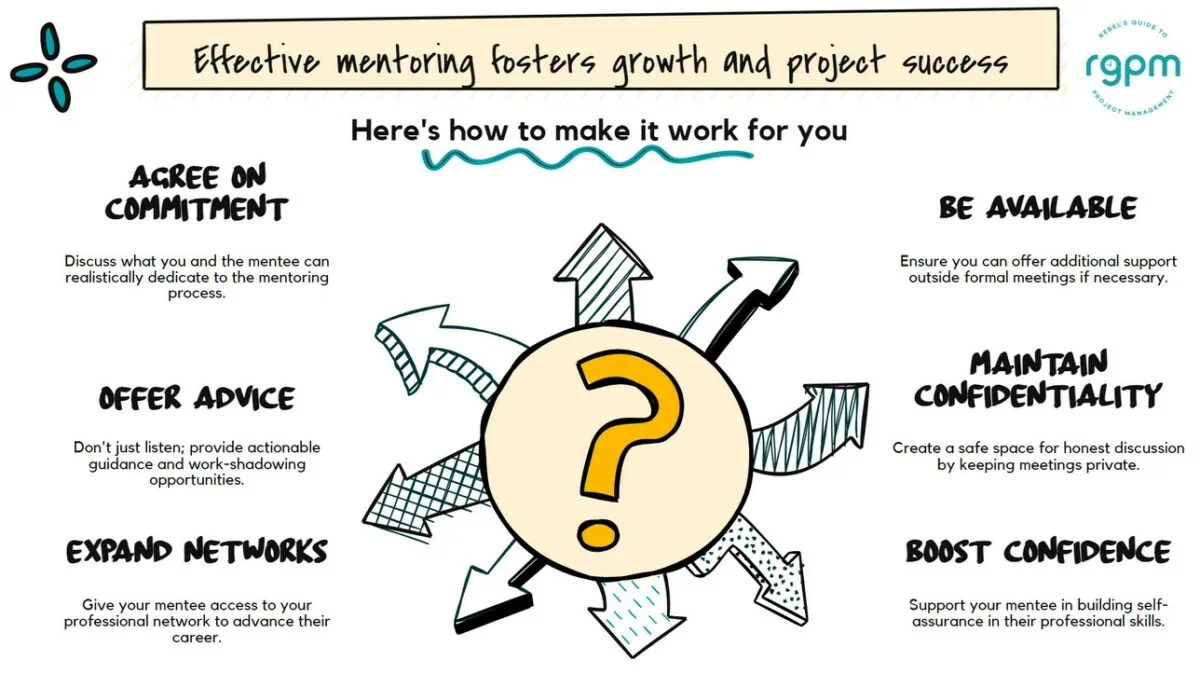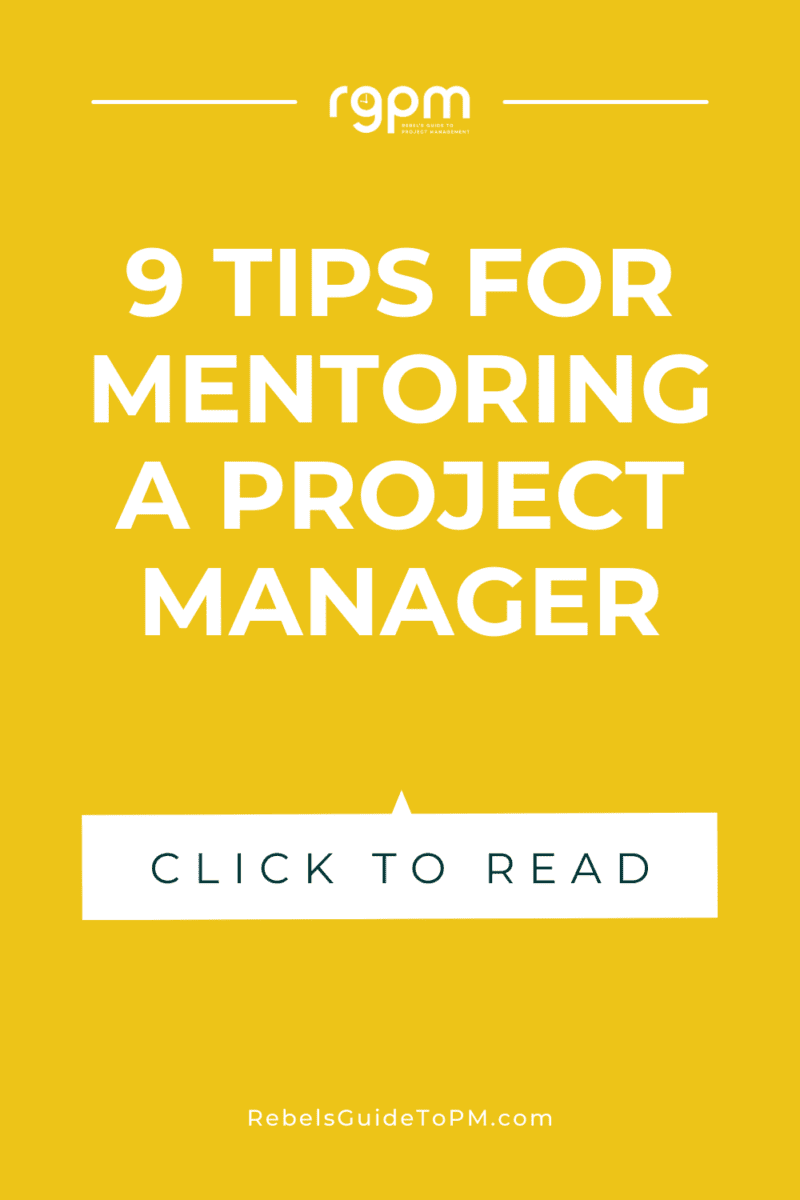9 Tips For Mentoring a Project Manager
This blog is reader-supported. When you purchase something through an affiliate link on this site, I may earn some coffee money. Thanks! Learn more.
Have you been asked to mentor another project manager?
It might sound a bit daunting, but I’ve been doing it for over 15 years, and I’m here to tell you that it’s a great opportunity (for both of you). And it is possible to be a good project management mentor, even if you don’t have any previous mentoring experience.
Being asked to mentor someone means that your experience has been recognized as a project management professional (not necessarily a certificate holder, but someone who knows how to do the job well).
Whether the request comes about as a result of an informal discussion or a formal corporate scheme, you should take the commitment to be a mentor seriously.
It’s also a good career opportunity for you – working with a more junior project manager can give you a different insight into project management topics and they are likely to have different experiences to share with you as well.
In this article, you’ll learn how to approach mentoring a project manager and some practical tips to help you be a fantastic mentor to your new mentee (yes, that’s a word!)
Who are you mentoring?
Experienced and mid-career professionals are often asked to mentor junior project managers or entry-level professionals.
Perhaps you’ve been asked to mentor an apprentice, or someone new to the PMO or team. Perhaps you’ve been asked to mentor a middle-grade manager with a view to helping them achieve a promotion.
Why do they want a mentor?
Project managers want a mentor for lots of professional development reasons. I mentor project managers at all stages of their careers and here are some common reasons why people book a power hour with me:
- Career planning, CV/resume review, preparing for a promotion or reviewing career goals
- Just got a new job and want to make a good impression in the first month
- Navigating the difficult, messy people stuff of stakeholder engagement, communication and leadership skills
- Wanting to not be alone as the only person in their department who does project management.
That last point about wanting a second opinion or a sounding board while being the only person in the team who does a project management role might not apply to you if you are mentoring someone within your company.
However, you might find that as a project manager in the PMO, you are mentoring others across the business who are doing projects but who do not work in the PMO – they can feel the same about the role being isolating.

Mentoring is not coaching
Mentoring is not coaching, but to be honest, I’m taking a mentoring certification at the moment and we are learning many of the same models and theories that are covered in the coaching books I’ve read.
One of the top recommended books on my course is The Mentoring Manual by Julie Starr, and it’s got hardly any specific theory in at all.
My takeaway from this is while coaching is a specific, accredited skill, mentors can still benefit from knowing a bit of theory. However, if you don’t, it doesn’t matter because mentoring is more about sharing your project management experience and asking questions to help the mentor develop.
I’ll give you a (fictional) example.
Mentee: I’m struggling with how to apply project quality management because no one seems to want to invest any time in it.
Coach might say: Tell me more about that.*
Mentor might say: OK, tell me what you’ve tried so far and if you like I’ll tell you what I’ve done that’s worked in the past… Now shall we put a few ideas down about what you’re going to do in the meeting next week and next time we meet you can fill me in on how it went?
*I’m not a coach, but coaching principles are that the coach does not provide solutions, instead, helping the coachee to come up with a plan and route forward themselves.
One of the big worries that many new mentors have is that they don’t know if they are worthy of taking on the role.
If you have even a little bit more practical experience than the person you are mentoring, you’ve got opinions, guidance and advice that you can share.
So, now that you are preparing to mentor a colleague, what should you bear in mind? Here are 9 tips for making sure you can be a good project management mentor.
1. Agree the commitment
What, exactly, are you both signing up for? Discuss what you both can commit to as you may find that your prospective mentee wants a lot more than you can offer.
You should both be happy with the level of commitment required. This could be anything from a monthly telephone conversation to a weekly face-to-face meeting so it’s important that you agree something that is going to work for you both.
You may have to build some flexibility into this. For example, if one of you is managing a project that is going through a particularly busy time or that involves a lot of travel then you might not be able to meet up in your regular slot.
Most mentoring relationships can accommodate this but it’s worth talking about it before it happens.
A formal mentoring program might recommend meeting for an hour a month, or, if the person is a new starter, an hour a week or more. The mentoring role can be quite a commitment.
Even if your arrangement is informal it is worth documenting what you have agreed so that you have some kind of ‘contract’ in place and you both have a clear idea about what is expected.
Read next: Questions to ask a project management mentor
2. Be available
Once you’ve agreed to mentor a colleague, make sure that you can be available for them and not just in the pre-agreed mentoring sessions that you have arranged. It’s possible that they will have issues that they want to discuss with you at times outside of those formal meetings and it will benefit you both if you can make some time in your schedule to talk to them when they need it.
Equally, if you hear of an opportunity or something that affects the project that they are working on, don’t wait until your next scheduled discussion. Give them a call and chat it through.
3. Offer advice
Mentoring isn’t just about listening to their problems and as we saw above it’s not coaching. If they ask for advice, give it.
Your mentoring activities could also include them work shadowing you to see how you facilitate a meeting, for example.
You have a lot of project management knowledge to share and your experience is one of the reasons why this person chose you as their mentor. Of course, just because you give advice don’t expect them to take it!
They can think through their own decision-making process and may choose to do something else and that’s fine – don’t take it personally!
4. Be confidential
The relationship between a mentor and a mentee should be confidential, so that you both have confidence that what you say in your meetings goes no further. This is important because you may be talking about office politics or the working relationship between your colleague and someone else on their project team.
You both need to know that you can speak honestly and openly and that what is said won’t get reported back.
Think about how and where you are going to meet to maintain confidentiality. You’ll need to be in a private room (whether you are meeting virtually or in-person) to make sure no one overhears your conversation, especially if sensitive issues are on the agenda.
Make sure that your agreement to be confidential is part of the arrangement you put in place at the very beginning of your mentoring relationship.
5. Provide access to your network
One of the other reasons why your colleague chose you is likely to be for access to your network. If they are looking for a new job or are keen to get ahead and build their reputation, then they will appreciate being included in your network and the opportunities you can create for them.
You don’t have to put them forward all the time but remember that part of being a mentor is championing their interests. Networking is important. If you hear of a job opportunity or a new project that you think they might be interested in, then suggest them to the hiring manager.
You will need to have a conversation with your mentee about what they are looking for in their future career so that you can look out for the right kinds of opportunities.
6. Build their confidence
Many people turn to mentoring to get more confidence in a particular area, and I’ve certainly found that with the people I mentor.
Often, it’s soft skills, interpersonal skills, power skills… you know what I mean. Or stakeholder engagement and navigating office politics.
However, I’ve also mentored people who wanted help with dashboards and project reporting, understanding risk management and other more technical skills.
Often what we do on mentoring calls is reviewing project management documents so they can feel confident they are putting out good quality project artifacts and plans.
7. Listen
The big challenge with mentoring is to rush straight in with, “Let me tell you what I’d do…” and not really listening to the problem they are facing.
Ask clarifying questions so you understand the challenge they are talking about, for example:
- “What happened next?”
- “What were you thinking in the moment?”
- “Can I clarify if I’ve understood?” (and then paraphrase what you have heard)
- “What do you want to happen?”
Active listening – where you focus, acknowledge and pay attention instead of letting your mind wander – is a key competency for mentors.
8. Be honest
Let’s say your mentee has made a dubious choice. They will only develop if they can reflect on why that was the wrong path and what alternative choices might have been available at the time. And they can only do that if you are honest with them.
They also need to be honest with you – if they’re telling you that it’s all fine, then you’d have to question why they wanted a mentor in the first place.
9. Consider mentoring a two-way relationship
Look at the mentoring relationship as a partnership and remember that you can learn as much as they can from your discussions!
It’s OK to ask your mentee a question, or to say, “I’ve never thought about it that way before, let’s work it out together.”
They won’t expect you to know everything or to have done everything, so it’s fine to be honest about your experiences and say when something is new for you too. Yes, you are in a role model-type position, but you aren’t on a pedestal.
Your next steps
Mentoring is a great way to boost your career and gain new skills as well as supporting junior colleagues. And it’s a way to retain talent in the organization, so the company benefits too.
Why not put the word out that you’re open to mentoring colleagues?
Need a mentor?
Book a power hour with me. Gain some clarity about your career or get support for a project in a one on one session.
Pin for later reading

